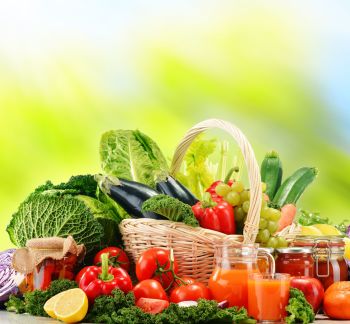IN-HOSPITAL NUTRITIONAL SUPPORT FOR PATIENTS WHO FOLLOW A VEGAN DIET by Samuel Lucking, RD
Posted on
Hospitals are obliged to take into consideration a patient’s right to diet preferences, so with the rise in individuals becoming vegetarian or vegan, it is becoming increasingly difficult for hospitals to meet the needs of this cohort, especially with oral nutritional supplements (ONS)and enteral feeds.
 Veganism is on the rise in the UK and it is reported that in 2021 there were approximately 600,000 people who signed up to take part in Veganuary, an increase of 100,000 on 2020.
Veganism is on the rise in the UK and it is reported that in 2021 there were approximately 600,000 people who signed up to take part in Veganuary, an increase of 100,000 on 2020.
The surge in people turning to a plant-based food has been fuelled by increasing evidence in scientific literature supporting the health benefits of this diet. These health benefits include improvements to cardiovascular health, weight loss and a reduced risk of developing type 2 diabetes.1 Other reasons for people switching to a vegan diet include concerns over animal welfare, animal rights and the environmental impact of animal food production.2
A PLANT-BASED DIET
A plant-based diet is based on foods that come from plants with few or no ingredients that come from animals. Food include vegetables, wholegrains, legumes, nuts, seeds and fruits. A vegetarian diet is usually described as not containing meat, poultry, fish, shellfish or any by-products of slaughter.
There are many versions of a vegetarian diet including:
- Lacto-ovo-vegetarian: probably the most common vegetarian diet as it includes dairy products and egg.
- Pescatarian: comprising largely plant-based food but also including fish.
- Flexitarian: a mainly plant-based diet but occasionally includes meat or poultry.
THE VEGAN DIET
A vegan diet does not include any products of animal origin. This diet, therefore, excludes dairy products, eggs and honey, and avoids animal-derived materials such as gelatine or vitamin D3 supplements if they are derived from an animal source such as sheep's wool. This diet is, therefore, more restrictive.3
HOSPITALS AND THEIR OBLIGATIONS
Veganism comes within the scope of international human rights provisions and vegans in the UK are protected under human rights and equality law. This means that hospitals have an obligation to ensure that they do not interfere with a vegan’s right to freedom of conscience, and a responsibility under the Equality Act 2010 to avoid any discrimination on the grounds of veganism.4
Current Care Quality Commission (CQC) guidance recommends that nutritional care should be provided in a way that respects equality and diversity, including when a person has specific dietary requirements relating to moral or ethical beliefs, such as vegetarianism. Every effort, therefore, should be made to meet people's preferences.5
MEETING PATIENTS' NEEDS
The majority of hospitals in the UK have specialised vegan menus and appropriate snacks and fluids, in order to cater for this cohort of patients. However, when additional nutritional support is required due to disease-related malnutrition, reduced appetite or a non-accessible gastrointestinal tract, it is increasingly hard to meet these needs.
When surveyed, the majority of providers of oral nutritional supplements (ONS) into hospitals stated that they do not manufacture ONS suitable for a vegan diet. This is mirrored in the range of enteral feeds available. The medical nutrition companies sampled referenced the use of milk protein and the use of sheep's wool to synthesise vitamin D used in their products.
This highlights a huge failure of the current health service to adequately support this patient group when nutritional requirements cannot be met using food alone. There is also a clear gap in the market for advancements in oral and enteral nutrition support which are suited to a vegan diet.
NON-VEGAN ONS: PATIENT CONSENT
Patients following a vegan diet should be fully informed by practitioners when recommending ONS/enteral feeds that contain animal products. Where it is not possible to gain informed consent from the patient, an advocate should be fully informed and consent gained prior to using artificial nutritional support products which contain any ingredients derived from an animal source.6
Samuel Lucking, MSc, RD
Surgical and Nutrition Team Dietitian, Royal Stoke University Hospital
Sam has 10 years of clinical experience working within the NHS.
Specialist interests include upper and low gastrointestinal surgery
upper GI cancer care and management inpatient TPN.
Twitter@:samuel_lucking
References
- Harland J, Garland L (2016). An update of the evidence relating to plant-based diets and cardiovascular disease, type 2 diabetes and overweight. Nutrition Bulletin, British Nutrition Foundation [online], 41(4) p 323-338
- Nutrition.org. Plant based diets [online]. Available from: https://www.nutrition.org.uk/putting-it-into-practice/plant-based-diets/plant-based-diets/ [08/02/22]
- Nutrition.org. Plant based diets [online]. Available from: https://www.nutrition.org.uk/putting-it-into-practice/plant-based-diets/plant-based-diets/ [08/02/22]
- Vegansociety (2021). What rights do vegans have?[online]. Available from: https://www.vegansociety.com/get-involved/international-rights-network/what-rights-do-vegans-have [08/02/22]
- CQC (2022). Regulation 14: Meeting nutritional and hydration needs[online]. Available from: https://www.cqc.org.uk/guidance-providers/regulations-enforcement/regulation-14-meeting-nutritional-hydration-needs#guidance [08/02/2022]
- Vegansociety (2021). In Hospital [online]. Available from: https://www.vegansociety.com/take-action/campaigns/catering-everyone/information-news/hospitals [08/02/22]
